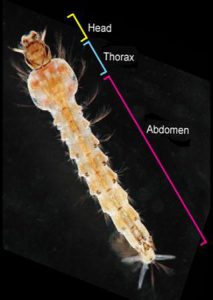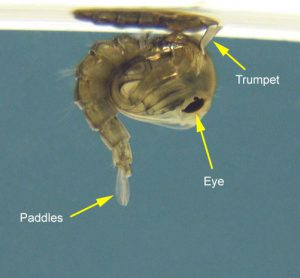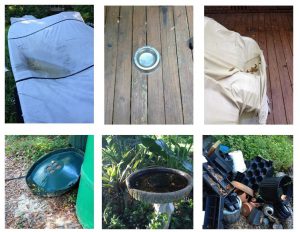In north Florida, the arrival of warm weather and plenty of rain means it’s time to battle the mosquitoes again. Those pesky little blood-suckers are out and about, often keeping us from enjoying our outdoor pursuits. With some preventative steps, you can reduce the potential for mosquitoes to occur in your yard.
As we should all be aware of by now, mosquitoes require water to complete their lifecycle. Eggs are laid near the water and will dry out if they do not remain near a water source. The larvae, or “wrigglers”, that hatch from the eggs, are aquatic and will not survive out of water. The pupae, often called “tumblers”, are also aquatic and must be in water to survive. From the pupae hatch the adults, the growth stage we want to avoid.
The best method to reduce mosquitoes in your yard is to remove or empty water-holding containers. This prevents the conditions needed for the egg through pupae stages to survive. These water-holding containers can include birdbaths, old buckets, gutters, tarps, rain barrels, and a variety of other items. Even a small bottlecap is enough to breed mosquitoes. Regularly emptying these water-holding containers every 3 to 5 days will stop that most annoying final life stage – the biting adults.
Another way to prevent the aquatic stages of mosquitoes from thriving is to use a larvaecide, specifically Bti. Bti is a bacterium that is sold as either small dunks or doughnuts and can also be found as small granules. Placing a dunk or a few granules in a birdbath will prevent larvae from developing and won’t harm the birds or other organisms that may visit, including frogs, bees, butterflies, and mammals. Bti is a selective pesticide, only effective for control of mosquito, midge, and fungus gnat larvae.
Even if you’ve cleaned up or drained all water-holding containers on your property, there will likely still be some adult mosquitoes looking for a bloodmeal. Wearing long pants and sleeves, using mosquito repellents, and keeping window screens in good order are effective methods to prevent being bitten.
Local mosquito control agencies will often provide services to fog for adults. However, this will want to be your last resort, as the pesticides used to control adults are not as selective as the Bti used for the larvae. This results in non-target damage, meaning that insects besides mosquitoes, including beneficial insects, may also be harmed. Therefore, controlling mosquitoes during their aquatic lifestages helps reduce the need for pesticides that can harm beneficial insect populations.
The UF/IFAS Florida Medical Entomology Laboratory Research and Education Center has a great website – https://fmel.ifas.ufl.edu/ – of mosquito-related information, including the various species of mosquitoes in Florida and which repellents work the best. For additional information on controlling mosquitoes and other pests, please contact your local Extension Office.
- Let Extension Diagnose Your Landscape Issues - May 28, 2025
- No Mow March 2025! - February 27, 2025
- New Year’s Resolution Ideas for Gardeners - January 16, 2025



